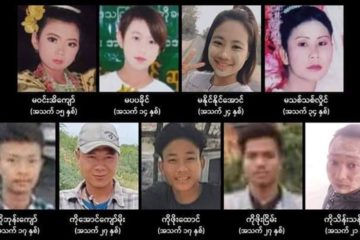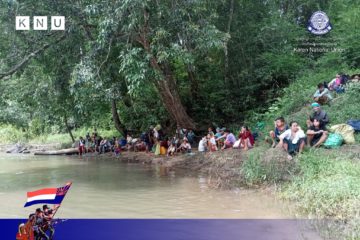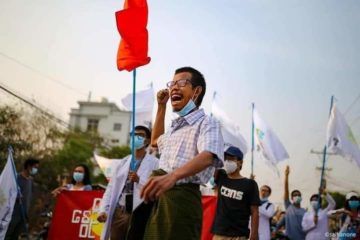
- News from Rakhine: https://www.dmediag.com/news/2978-10ps-release-f-insein ; https://www.dmediag.com/news/2980-awa-usa-call
- Last but not least the important dilemma of the Myanmar people: the Rohingya community and NUG’s statement on their citizenship and human rights (because after all they are also human like us) https://thediplomat.com/2021/06/why-the-national-unity-governments-statement-on-myanmars-rohingya-is-important/
- https://www.reuters.com/article/uk-myanmar-politics-india-border/india-frets-as-myanmars-pro-democracy-fighters-cross-border-idUSKCN2DM138
https://www.rfa.org/burmese/news/rakhine-critize-nug-rohingya-policy-06102021051731.html
https://www.rfa.org/english/news/myanmar/arakan-terrorism-06102021071326.html
What’s going on in Rakhine?
The Myanmar military junta has dropped charges against 10 Rakhine ethnic people who were arrested in 2019 on terrorism charges by being associated with the Arakan Army. 3 of the prisoners were relatives of the AA chief Major-General Tun Myat Naing.
The military junta is trying to improve tensions between the AA as it is one of the formidable ethnic armed organisations apart from the United Wa State Army which can effectively challenge its authority and strength.
The AA was put on the list of terrorist organisations by Burmese authorities in 2020 after intense fighting broke out between them and the Tatmadaw in 2018. However the military council then removed the AA from this list after the coup on May 11th. There was a ceasefire between the AA and the Tatmadaw in late November 2020.
Before the military war between the Tatmadaw and AA, there was an eruption of violence in Rakhine state when the military performed an ethnic cleansing operation against the minority ethnic group, the Rohingyas in 2017 which brought Myanmar to the International Criminal Court in 2019.
https://www.rfa.org/english/news/myanmar/arakan-terrorism-06102021071326.html
This article [ https://www.tni.org/en/article/the-arakan-army-myanmar-military-coup-and-politics-of-arakan?fbclid=IwAR0oGFTdoRqri12Q00OoiOZR88Lv-xQoX_fFouvlwsEp_dBZtj_DEFx9TLk ] explains very well the complexities in Rakhine state at the moment. The AA has been criticised for remaining mostly silent during the junta’s brutal crackdown on Bamars and other ethnic groups alike. EAOs such as the KIA and the KNU have taken up arms against the Tatmadaw and sheltering those fleeing from prosecution into their protected territories which has seen thousands of displaced civilians and almost daily airstrikes. The situation in Rakhine seems to be almost back to normal with children returning to school while in the rest of Myanmar, the students are boycotting education. Many of Arakan’s leaders see the current political crisis as a power struggle between the Bamars: the Tatmadaw and the NLD.
The United League of Arakan (ULA) and the AA receive popular support from the Rakhine communities. Their popularity and strength are also based on its well-trained soldiers and a young leadership which reads the evolving mood and political situation of the country perceptively well.
“In the post-coup context, some analysts believe that the political instability in central Myanmar (Burma Proper) will provide greater leverage for the ULA-AA to advance its “Way of Rakhita” philosophy in order to achieve its “Arakan Dream”.”*
Both the Way of Rakhita and Arakan Dream are intended to be more inclusive for all ethnic and religious groups in Arakan compared to a more conservative Rakhine tradition in which ethno-nationalism is regarded the key to political autonomy.
However it is neither black nor white. The AA may not be publicly joining in forces with its ethnic brothers but its soldiers are fighting against the military with EAO allies i.e. KIA and the ULA has declined to join the National Unity Government.
Another complication is the Arakan National party (ANP) who has joined the military council after the coup. During the November elections, most of Northern Rakhine was unable to participate in the elections (3 fourths of Rakhine’s eligible voters) due to voting cancellations apparently because of conflict in the area, and Rakhine state faced one of the longest internet shut downs in the world. The ANP has also won the majority of the elections while under the SAC (military State Administration Council). This is a controversial issue with the majority of the Rakhine population as it is unclear whether the ANP represents the will of the Rakhine people since their votes were taken away before the coup. However, in May, after a party meeting in Sittwe, the ANP chairman U Tha Tun Hla announced that ANP may end its collaboration with SAC. ANP will make a final decision in the next meetings, a sign of divisions within the party.
The AA has stated before in 2019 that it will try to achieve the way of the Rakhita of the Rakhine people which is more inclusive of Rakhine’s diverse ethnicities. The ULA-AA movement could also attribute to the desire of the Rakhine people to have an autonomous state. The judiciary system of the ULA has been generally welcomed amongst its minorities including the Rohingya for its impartiality, decisiveness and results-orientated manner. Arakan society is presently seen to be more united and organised than during previous governmental eras in modern history.
The politics in Rakhine is complicated. During the US House Foreign Affairs Committee on May 4th, UN ambassador for Myanmar U Kyaw Moe Tun was criticised for not having an appropriate answer to NUG having a clear policy for the Rohingyas including their citizenship rights and for not having a Rohingya representative in the NUG. On June 3rd, the NUG announced that the Rohingyas will be given citizenship rights and that the 1982 citizenship law created by the military regime would be abolished. Shortly after ….The All Arakanese Solidarity Committee (AASC), a Rakhine State-based network of civil society organizations, community leaders and politicians, and the Arakan Liberation Party (ALP) have released statements in opposition to the NUG’s Rohingya policy. The AA on the other hand has declined to comment on the NUG’s policy of the Rohingyas. https://www.irrawaddy.com/news/burma/myanmars-parallel-govts-rohingya-policy-angers-rakhine-groups.html
The AA may have be indecisive initially how to react to the coup. After it declared a ceasefire unilaterally in June 2020, it has tried multiple times to interact with the NLD party but to no avail. NLD didn’t want to engage with it.
After its silence in the beginning the AA finally condemned the coup on March 23rd for its violent crackdown on protesters. This is most probably due to the fact that many Rakhine people were also opposed to the coup including the Rohingyas.
One also needs to remember that the Rohingya people were not the only ethnic group to suffer from conflict and poverty in Rakhine state. Since the Burmese took over the Arakan Kingdom in the 18th Century, the state of Rakhine had been left to fend for itself and more recent fighting between the AA and the Tatmadaw has displaced thousands of civilians: ethnic Rakhine, Chin, Mro people who have been living in IDP camps under precarious conditions for years. No one can blame the Rakhine people for wishing to establish an autonomous state for themselves during the height of AA’s rule and power.



0 Comments